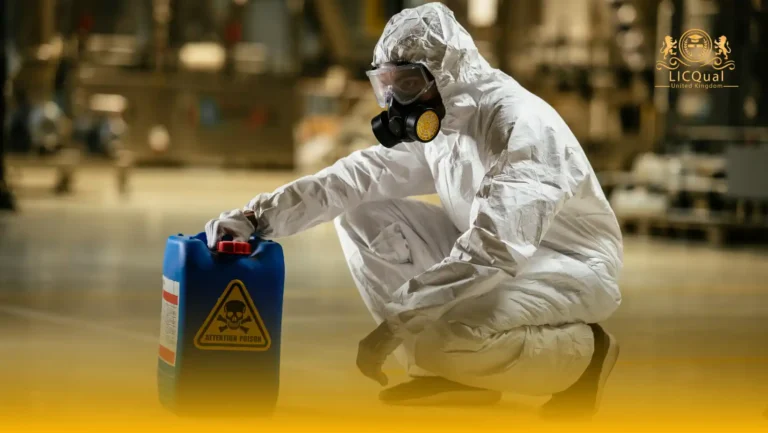The LICQual Award in Construction Site Incident Investigation is a highly specialized program designed for professionals seeking to enhance their skills in investigating accidents and incidents on construction sites.
In an industry where safety is paramount, this qualification provides you with the essential tools and knowledge to conduct thorough investigations, analyze causes, and implement preventative measures to reduce risks. Whether you’re a construction safety officer, site manager, or a risk management professional, this course is an invaluable asset in your career development.
As construction sites present unique safety challenges, understanding how to manage and investigate incidents is crucial. The LICQual Award in Construction Site Incident Investigation is designed to give you a deep understanding of the accident investigation process, from initial response to the formulation of corrective actions. With a focus on practical skills and legal compliance, this qualification ensures you are well-equipped to improve safety standards and reduce the likelihood of future incidents in the construction environment.
The LICQual Award in Construction Site Incident Investigation provides a comprehensive exploration of incident investigation techniques tailored specifically to the construction industry. This course covers critical topics such as hazard identification, risk assessment, evidence collection, and the legal and ethical aspects of incident investigations.
Throughout the program, participants will engage with real-world case studies and practical scenarios, helping them build the skills needed to manage site incidents effectively. The course also emphasizes report writing, including how to create clear, actionable, and legally sound reports that comply with industry regulations.
Upon completion of this award, you will be prepared to lead incident investigations, identify root causes, and implement corrective measures to enhance workplace safety. The LICQual Award in Construction Site Incident Investigation is an essential qualification for anyone looking to play a key role in improving construction site safety and reducing accidents, ultimately contributing to a safer, more efficient work environment.
Course Overview
Qualification Title
LICQual Award in Construction Site Incident Investigation
Total Units
6
Total Credits
6
GLH
12
Qualification #
LICQ2200058
Qualification Specification
|
Qualification# |
Unit Title |
Credits |
GLH |
|---|---|---|---|
|
LICQ2200058-1 |
Introduction to Construction Site Incident Investigation |
1 |
2 |
|
LICQ2200058-2 |
Hazard Identification and Risk Assessment |
1 |
2 |
|
LICQ2200058-3 |
Data Collection and Evidence Gathering |
1 |
2 |
|
LICQ2200058-4 |
Investigative Techniques and Root Cause Analysis |
1 |
2 |
|
LICQ2200058-5 |
Report Writing and Documentation |
1 |
2 |
|
LICQ2200058-6 |
Legal, Ethical, and Regulatory Considerations |
1 |
2 |
By the end of this course, learners will be able to:
1. Introduction to Construction Site Incident Investigation
- Demonstrate a clear understanding of the construction site incident investigation process and its significance in improving site safety.
- Identify the key roles and responsibilities of an investigator in managing site incidents.
- Apply legal, regulatory, and ethical frameworks in the planning and execution of construction site investigations.
2. Hazard Identification and Risk Assessment
- Utilize hazard identification techniques to assess potential risks on construction sites.
- Apply risk assessment methods to evaluate the severity and likelihood of hazards and implement control measures.
- Understand the relationship between risk management and accident prevention on construction sites.
3. Data Collection and Evidence Gathering
- Employ best practices for gathering and preserving accurate and reliable evidence during incident investigations.
- Conduct effective site inspections and document findings in a systematic and organized manner.
- Use interview techniques to gather information from witnesses and involved parties to support the investigation process.
4. Investigative Techniques and Root Cause Analysis
- Apply investigative techniques to analyze incidents and determine the underlying causes.
- Use root cause analysis methods, such as the 5 Whys and Fishbone Diagram, to identify contributing factors to construction site incidents.
- Analyze incident data to propose corrective actions that address the root causes and prevent recurrence.
5. Report Writing and Documentation
- Write clear, concise, and legally sound incident investigation reports that outline findings, root causes, and recommendations.
- Structure investigation reports to effectively communicate key information to stakeholders and management.
- Document corrective actions and safety improvements in a manner that meets industry standards and regulatory requirements.
6. Legal, Ethical, and Regulatory Considerations
- Demonstrate knowledge of legal and ethical responsibilities in the construction site investigation process.
- Understand key national and international regulations (e.g., OSHA, HSE) that govern construction site safety and investigations.
- Apply ethical principles in conducting investigations, ensuring fairness, confidentiality, and accountability.
This diploma is ideal for:
Assessment and Verification
All units within this qualification are subject to internal assessment by the approved centre and external verification by LICQual. The qualification follows a criterion-referenced assessment approach, ensuring that learners meet all specified learning outcomes.
To achieve a ‘Pass’ in any unit, learners must provide valid, sufficient, and authentic evidence demonstrating their attainment of all learning outcomes and compliance with the prescribed assessment criteria. The Assessor is responsible for evaluating the evidence and determining whether the learner has successfully met the required standards.
Assessors must maintain a clear and comprehensive audit trail, documenting the basis for their assessment decisions to ensure transparency, consistency, and compliance with quality assurance requirements.







